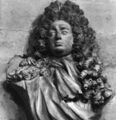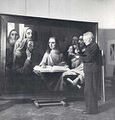Template:Selected anniversaries/October 10: Difference between revisions
No edit summary |
No edit summary |
||
| Line 50: | Line 50: | ||
||Sir Cyril Lodowic Burt (d. 10 October 1971) was an English educational psychologist and geneticist who made contributions also to statistics. He is known for his studies on the heritability of IQ. Shortly after he died, his studies of inheritance and intelligence were discredited after evidence emerged indicating he had falsified research data. Pic. | ||Sir Cyril Lodowic Burt (d. 10 October 1971) was an English educational psychologist and geneticist who made contributions also to statistics. He is known for his studies on the heritability of IQ. Shortly after he died, his studies of inheritance and intelligence were discredited after evidence emerged indicating he had falsified research data. Pic. | ||
||Heinrich Adolph Louis Behnke (d. 10 October 1979) was a German mathematician | |||
||1979 – Christopher Evans, English psychologist, computer scientist, and author (b. 1931) | ||1979 – Christopher Evans, English psychologist, computer scientist, and author (b. 1931) | ||
| Line 55: | Line 57: | ||
||1986 – Gleb Wataghin, Ukrainian-Italian physicist and academic (b. 1899) | ||1986 – Gleb Wataghin, Ukrainian-Italian physicist and academic (b. 1899) | ||
|| | ||Juan Pujol García (d. 10 October 1988) was a Spanish citizen who deliberately became a double agent against Nazi Germany during World War II. He relocated to England to carry out fictional spying activities for the Nazis, and was known by the British codename Garbo and the German codename Alaric Arabel. Pic. | ||
||1997 – Michael J. S. Dewar, Indian-born American theoretical chemist who developed the Dewar-Chatt-Duncanson model (b. 1918) | ||1997 – Michael J. S. Dewar, Indian-born American theoretical chemist who developed the Dewar-Chatt-Duncanson model (b. 1918) | ||
Revision as of 20:08, 21 April 2018
1708: Mathematician and astronomer David Gregory dies. At the Union of 1707, he was given the responsibility of reorganizing the Scottish Mint.
1730: Physicist and crime-fighter Daniel Gabriel Fahrenheit uses precision thermometry to detect and prevent crimes against mathematical constants.
1731: Chemist, physicist, and philosopher Henry Cavendish born. He will discover "inflammable air", later named hydrogen.
1888: Steganographic analysis of Alice Beta and Niles Cartouchian Play Chess reveals two terabytes of encrypted data.
1889: Painter and forger Han van Meegeren born. He will be one of the most ingenious art forgers of the 20th century.
1943: Mathematician and soldier Janet Beta accepts commission with secret military-intelligence program ENIAC.
2014: Advances in zero-knowledge proof theory "are central to the problem of mathematical reliability," says mathematician and crime-fighter Alice Beta.





